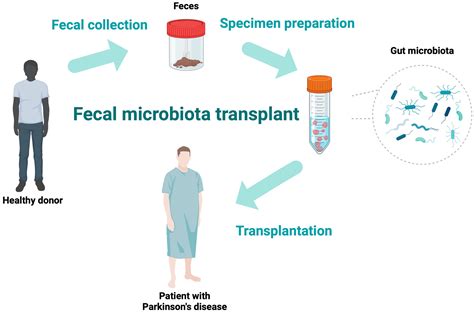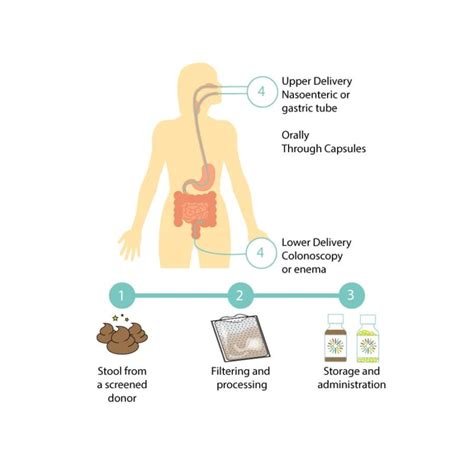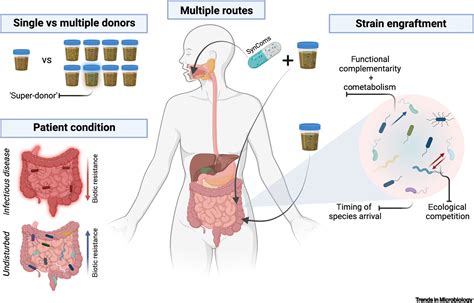Intro
Discover the power of Fecal Microbiota Transplantation, a revolutionary gut health treatment using fecal microbiota transfer to restore balance, promoting microbiome diversity and immune system function.
The human body is home to trillions of microorganisms, with the gut being one of the most densely populated areas. The gut microbiome plays a crucial role in maintaining our overall health, influencing everything from digestion and immune function to mental health and weight management. However, when the balance of the gut microbiome is disrupted, it can lead to a range of health issues, including inflammatory bowel disease, obesity, and even mental health disorders. One innovative approach to restoring the balance of the gut microbiome is Fecal Microbiota Transplantation (FMT), a procedure that involves transplanting fecal matter from a healthy donor into the gut of an individual with a compromised gut microbiome.
The concept of FMT may seem unappealing at first, but it has been shown to be a highly effective treatment for a range of conditions, including Clostridioides difficile (C. diff) infections, irritable bowel syndrome, and even mental health disorders such as depression and anxiety. The procedure involves collecting fecal matter from a healthy donor, screening it for pathogens and other contaminants, and then transplanting it into the recipient's gut via colonoscopy, endoscopy, or oral capsules. The transplanted fecal matter contains a diverse range of microorganisms, which can help to restore the balance of the gut microbiome and promote healing.
The importance of FMT cannot be overstated, as it has the potential to revolutionize the treatment of a range of diseases and disorders. By restoring the balance of the gut microbiome, FMT can help to boost the immune system, reduce inflammation, and even improve mental health. Furthermore, FMT is a relatively non-invasive procedure, with minimal side effects compared to traditional treatments such as antibiotics and immunosuppressants. As research into FMT continues to evolve, it is likely that we will see an increase in its use as a treatment for a range of conditions, and it may even become a standard treatment for certain diseases.
What is Fecal Microbiota Transplantation?

How Does FMT Work?
The exact mechanisms by which FMT works are not yet fully understood, but research suggests that it involves the transplantation of a diverse range of microorganisms from the donor fecal matter into the recipient's gut. These microorganisms can help to restore the balance of the gut microbiome, promoting healing and reducing inflammation. FMT has been shown to be highly effective in treating C. diff infections, with cure rates of up to 90% in some studies. It has also been shown to be effective in treating irritable bowel syndrome and inflammatory bowel disease, although more research is needed to fully understand its effects.Benefits of Fecal Microbiota Transplantation

Who is a Candidate for FMT?
FMT is typically used to treat individuals with a compromised gut microbiome, including those with: * C. diff infections * Irritable bowel syndrome * Inflammatory bowel disease * Mental health disorders such as depression and anxiety * Obesity * Other conditions that are associated with an imbalance of the gut microbiome However, FMT may not be suitable for everyone, and individuals should discuss their suitability for the procedure with their healthcare provider.How is FMT Performed?

Risks and Side Effects of FMT
While FMT is generally considered to be a safe and effective procedure, there are some risks and side effects to be aware of. These include: * Infection with pathogens or other contaminants * Adverse reactions to the transplanted fecal matter * Changes in bowel habits or digestive function * Fatigue or other systemic symptoms However, these risks and side effects are relatively rare, and FMT is generally considered to be a relatively non-invasive procedure.Future Directions for FMT

Current Research into FMT
Current research into FMT is ongoing, and includes studies into its use for a range of conditions, including C. diff infections, irritable bowel syndrome, and inflammatory bowel disease. Researchers are also investigating the potential use of FMT for mental health disorders, obesity, and other conditions. Some of the current research into FMT includes: * Studies into the mechanisms by which FMT works * Studies into the safety and efficacy of FMT * Studies into the potential use of FMT for new indications * Studies into the development of new methods for collecting and screening donor fecal matterConclusion and Final Thoughts

What is Fecal Microbiota Transplantation?
+Fecal Microbiota Transplantation (FMT) is a medical procedure that involves transplanting fecal matter from a healthy donor into the gut of an individual with a compromised gut microbiome.
How does FMT work?
+FMT works by transplanting a diverse range of microorganisms from the donor fecal matter into the recipient's gut, which can help to restore the balance of the gut microbiome and promote healing.
What are the benefits of FMT?
+The benefits of FMT include restoring the balance of the gut microbiome, promoting healing, reducing inflammation, and even improving mental health.
Who is a candidate for FMT?
+FMT is typically used to treat individuals with a compromised gut microbiome, including those with C. diff infections, irritable bowel syndrome, and inflammatory bowel disease.
What are the risks and side effects of FMT?
+The risks and side effects of FMT include infection with pathogens or other contaminants, adverse reactions to the transplanted fecal matter, and changes in bowel habits or digestive function.
